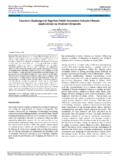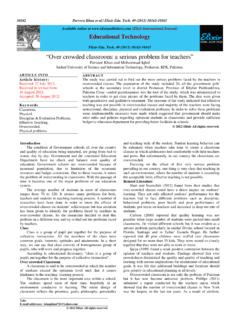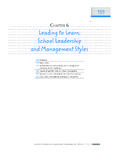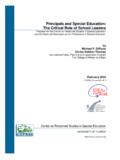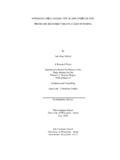Transcription of 3.1 School Standards - Sir Thomas Fremantle …
1 detention policy May 2013 SIR Thomas Fremantle secondary School detention policy 1. policy Statement Sir Thomas Fremantle School aims to create a climate for Learning environment where every individual student is able to develop fully and every member of staff is able to fully support students, unhindered by disruptive behaviour. The School recognises that some students will sometimes be involved in incidents of unacceptable behaviour. Sanctions must be applied against such individuals, but those sanctions must be just, fair and proportionate. detention is one such sanction but will normally be applied either for a repeated disruption, non-compliance or for a more serious one-off incident.
2 A detention provides an opportunity for reflection. It also offers a chance for staff and students to discuss what has happened and agree strategies to limit future incidents. 2. Involvement Pupils, staff, parents and governors will all have the opportunity to contribute to the future development of this policy . 3. Sanctions When behaviour is unacceptable, staff at Sir Thomas Fremantle School are empowered to use a variety of sanctions. These could include a verbal reprimand, referral to the Subject Leader, Form Tutor or a senior member of staff and involvement of parents and/or detention . A more detailed list is contained with the climate for Learning policy .
3 4. detention The Legal Position The following section of the policy details the legal position for schools as laid down in the 2011 Education Act : The Education Act 2011 removes the legal requirement to give parents 24 hours notice before detaining pupils after School . The Act confirms schools powers to use detentions by making it lawful for schools to put pupils aged under 18 in detention without parental consent at a variety of times outside School hours. Moreover, along with all other disciplinary penalties apart from exclusion, this sanction is detention policy May 2013 available to all School staff in lawful control or charge of pupils, and not just to teachers.
4 The exception would be if a Headmaster chose to limit the power of detention to certain groups of staff. Other legal requirements as regards detentions remain unchanged: detention is only an available sanction to a School if the Headmaster has previously determined this, and made it generally known within the School and to the parents of registered pupils of the School . The sanction of detention can only be applied to pupils aged under 18. Whilst no longer statutory, the School will continue to give parents 24-hours notice in most cases. This period is intended to inform parents of where their child is expected to be, and to allow parents an opportunity to make alternative arrangements for travel for the child.
5 Schools should take careful account of the circumstances of the detention known to them, for example, family holidays and care duties, or other commitments of the family, since the legality of the detention would be called into question if the School was acting unreasonably. However a mere inconvenience or disagreement with the penalty on the part of the parent is no excuse for non-attendance. No notice detention will only be used in exceptional circumstances as a response to non-compliance with the normal detention system or persistent lateness. It will only be authorised by a member of the senior leadership team. The times outside normal School hours when detention without parental consent may be given are evenings, plus weekends and certain non-teaching days (days which have been set aside wholly or mainly for members of staff to work but not to teach pupils, sometimes referred to as 'training days', 'INSET days' or 'non-contact days').
6 In the case of weekend detentions, this excludes a Saturday or Sunday which falls during, or at, a weekend immediately preceding or immediately following a half-term break. Some schools made use of detentions at weekends or on non-teaching days before the Education and Inspections Act 2006 was introduced, but this was only lawful where parental consent had first been obtained. The Act removes the requirement for parental consent for these detentions, thus removing a burden from schools and strengthening their disciplinary authority. Schools now have the power, if they wish, to require pupils to attend detentions on such days.
7 A School may require a pupil to attend detention on all non-teaching days except those excluded by the regulations. The regulations exclude non-teaching days that occur: on public holidays before the first day of term during a half-term break. detention policy May 2013 Non-teaching days that fall after the last School day of term are also generally excluded, but there is an exception: term-time weekday non-teaching days that immediately follow the day a School breaks up before half-term or the end of term may be used for detentions (so long as they are not public holidays). 5. What a detention can be used for: A range of activities can be required of the pupils which will be engaging and not lead to further ill discipline.
8 Such activities might include: completing assessed coursework undertaking tasks to assist staff, such as classroom-display work or materials preparation assisting staff with reparation tasks which do not raise any health and safety or child-protection issues. 6. Notifying parents about a detention : Whilst the Education Act 2011 removes the requirement that parents must be given 24 hours notice, the School will continue to follow this procedure in most cases. Notification will continue to mean: a letter, memorandum or pro-forma delivered by pupil-post or by mail (allowing for the time this will take to be delivered and the fact that the 24 hours' notice requirement applies from the time that the notification is received by the parent); a signed, dated note by a teacher or staff member in a pupil-planner (acceptable if there is clearly stated expectation in the School information to parents, for example, the home- School agreement or prospectus, that parents will read the planner every day for notes from School ).
9 An email or text notification may be used where schools have reason to be confident that the parent can be contacted reliably by this route, and where parents have previously signified agreement that communication of this sort can be sent to them via email or text. In best-practice a counter-signature or return-message is proof that parents know about the detention , but this is not a requirement for the detention to proceed. If there is doubt about the parents receiving or responding to a detention notification then some schools use a confirming phone-call, text-message, or email. A written record should be made of such contacts and retained in case of any subsequent challenge.
10 Transport: If a pupil is required to use transport to or from a detention (especially on a weekend or non-teaching day), the School should take into account whether such transport arrangements are reasonable and practicable. This may be a particular issue for schools where public transport detention policy May 2013 is limited or expensive. In these circumstances schools will want to make reasonable arrangements with parents while insisting on the terms of the detention being met. The pupil's out-of- School responsibilities: Schools will need to be sensitive to issues where a pupil is a primary carer, a looked-after child or vulnerable in other ways.
